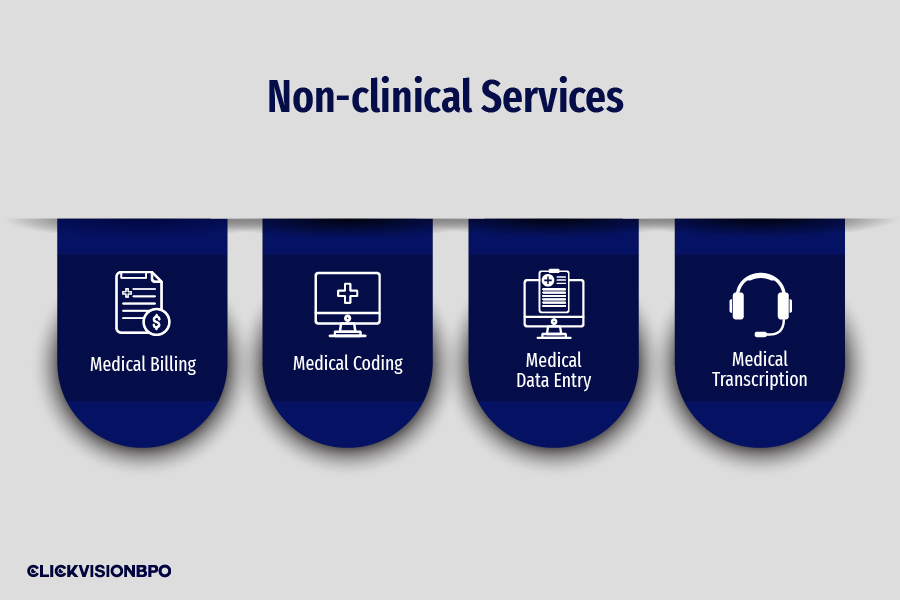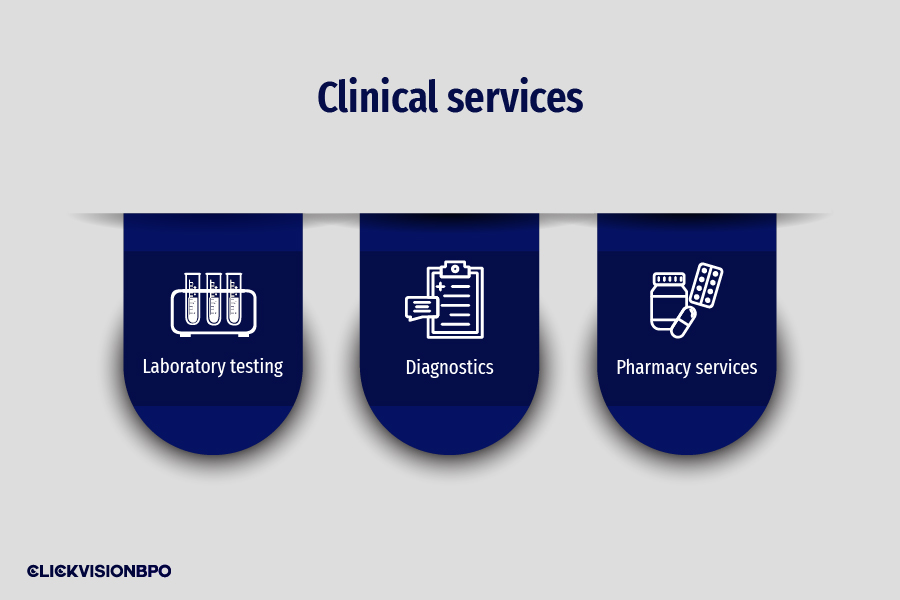Running a healthcare facility can be challenging these days. Such institutions provide healthcare services to their patients and solve all administrative challenges. But sometimes healthcare institutions decide on business process outsourcing, which greatly facilitates their management work. So, what services do hospitals outsource, and how does BPO help in successful management?
Stay with us as we present the importance of incorporating a BPO for effective healthcare facility management. In addition, we will introduce you to the most important non-clinical and clinical services offered by a healthcare facility.
What Services Do Hospitals Outsource?
What services do hospitals outsource, and how can you incorporate them into your organization? Outsourcing can offer various services that can be divided into two categories – clinical and non-clinical.
Non-clinical services typically include medical coding and billing, medical record transcription, housekeeping, appointment scheduling, patient registration, and more. On the other hand, clinical services can refer to diagnostics, pharmacy services, laboratory testing, radiology and imaging services, etc.
If you are looking for an ideal outsourcing solution, consider CLICKVISION BPO. Through specially designed services, our team will ensure to meet your requirements. Whether it is medical billing and coding or end-to-end outsourcing services, we are ready to offer solutions to help you better manage your healthcare facility.
To make it easier for you to understand the essence of outsourcing, we will provide you with a detailed overview of some of the most important non-clinical and clinical outsourcing services.

Source: freepik.com / Photo Contributor: funtap
Non-clinical services
Non-clinical services refer to those services that are not the main focus of health professionals. This type of outsourcing is the most popular among healthcare institutions and hospitals and includes services such as medical billing, medical coding, medical data entry and so on. The following text will describe the most common non-clinical services for which health institutions usually decide.
Medical billing
Medical billing is one of the most common non-clinical services that third-party companies can offer. Medical billing involves collecting payments for healthcare services such as treatments, tests, and consultations.
Many healthcare facilities and hospitals opt to hire third parties for this type of outsourcing service because of the cost. First, there are small and medium-sized businesses for which hiring billing staff can be expensive. Second, purchasing the appropriate software and infrastructure may lead to additional costs that may affect the quality of the healthcare service.
On the other hand, hiring offshore medical billing services can greatly benefit because it hires professionals who perform their tasks promptly. Due to the differences in time zones, such companies can work overnight so that the health facilities will receive the necessary results on time.
Medical coding
Due to the increased volume of paperwork, doctors will not have time to devote to providing a quality health service. Therefore, hiring an outsourcing company can help with the medical coding process.
Namely, medical coding involves converting diagnoses and medical notes into insurance codes. Each code corresponds to a specific service with a specific fee for the patient. In that way, healthcare providers can easily implement the healthcare billing service.
Medical data entry
Patient data is of crucial importance to the healthcare system. Doctors and health professionals use such data to determine the diagnosis better and provide the appropriate therapy.
The essence of data entry is to collect all relevant data about the patient’s health condition, which will build a profile that will help further processing. The most important data included in the data entries are the patient’s data, information about past illnesses, records of performed medical procedures, etc.
Medical transcription
Medical transcription converts video or audio files healthcare professionals make into paper or electronic documents. Such documentation can further monitor the patient’s health status and the next steps to be taken.
Hiring an assistant to perform transcription in the office usually costs a lot of money, so some healthcare workers also perform this task at the end of the day.
However, due to the exhaustion of healthcare workers, it happens that some of the records are transcribed incorrectly, which can negatively affect the health service. Therefore, many healthcare facilities and hospitals opt for a healthcare BPO that will manage such documents promptly and accurately.

Clinical services
In addition to non-clinical outsourcing, many healthcare facilities use clinical services that significantly reduce costs and increase work efficiency:
Laboratory testing
Every hospital should have laboratory services for the timely detection of illnesses. But sometimes setting up a laboratory means investing in expensive equipment, training staff, and allocating a certain space. Therefore, many hospitals opt for outsourcing with well-known laboratories specializing in different types of testing.
Diagnostics
X-ray machines, MRIs, and CTs are needed to diagnose a certain health condition. These machines are usually large and expensive and require specially designed rooms with soundproofing and temperature control. In some cases, hospitals partner with diagnostic centers to minimize costs and ensure speedy and accurate results, especially if they don’t have a dedicated trauma center.
Pharmacy services
Many hospitals have pharmacies on their premises, making medicines available to patients. However, some hospitals outsource this service to a reputable pharmaceutical chain. In this way, the hospital will save time recruiting pharmacists and ensure the quality and efficiency of the medicines.

Benefits of Outsourcing in Healthcare
By hiring third-party experts, healthcare facilities increase profits and operational efficiency and offer quality healthcare services. Some of the advantages of medical outsourcing are listed below:
Increased focus: Every healthcare facility aims to provide excellent healthcare service. By hiring an outsourcing company, healthcare professionals can fully devote themselves to patients’ health instead of paperwork and administrative work.
Reduced costs: Hiring staff, training, and supervision will significantly affect the financial situation of the health facility. Therefore, many healthcare facilities decide to outsource, which will significantly reduce their costs while providing a quality service.
Access to industry professionals: With outsourcing, you get access to a diverse pool of industry professionals who are well-suited for the job. Plus, outsourcing isn’t limited to BPO companies in your local area or country. You can choose from a wide range of experts from different regions, giving you more options to find the right fit for your needs.
Conclusion
Now that it’s clear what services do hospitals outsource, you understand the importance of hiring professional services that can increase the efficiency of a healthcare facility. If you are looking for a reliable outsourcing company that will meet your health and insurance needs, CLICKVISION BPO is at your disposal. Our team is ready to listen to your requests and create unique solutions that will help optimize your work.
At the very end, we hope this article has answered all your unclear questions about outsourcing in hospitals and the importance of hiring a BPO provider.

With a strong background in the marketing industry and healthcare leadership roles, Filip is responsible for CLICKVISIONBPO’s sales strategies and onboarding new clients. With a passion for sharing insights gained from his experience, he also shares valuable knowledge through industry related articles.
